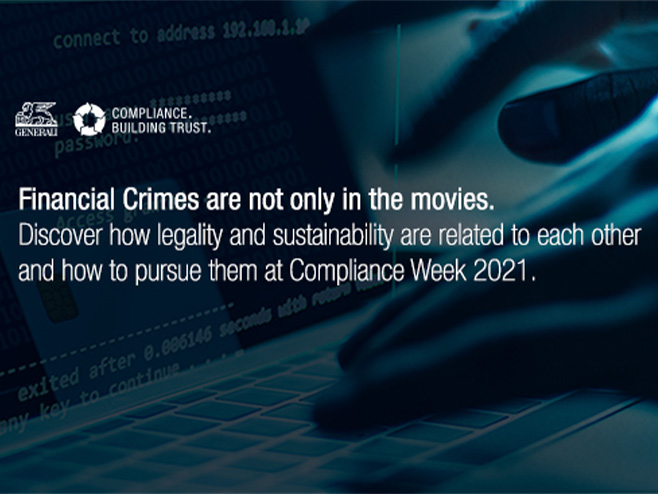12 January 2022
“New technologies in financial crime”: how do Artificial and Human Intelligence combine?
A robust compliance culture is essential to successfully achieve a company’s goals, but this is often not enough to prevent financial crimes and misconduct. How can the human factor be assisted by technology, and vice versa? That was the focus of the third webinar of Generali’s 2021 Compliance Week
In the last decade, technologies have changed our lives in many different aspects. Think just about smart phones, laptops, new payment methods, digital learning, home working.
Criminal organizations and individuals are also impacted by new technologies. As illustrated in the third webinar organized in the framework of Generali’s 2021 Compliance Week, during the pandemic there has been an alarming increase in cyber-crime. And that is why governments and international organizations are increasingly concerned about such new threats and their impacts on society.
As highlighted by Michele Riccardi, Deputy Director of Transcrime, Adjunct Professor of Financial and Business information analysis at the Università Cattolica del Sacro Cuore and member of the UN working group in the measurement of illicit financial flows, new technologies can positively contribute to the fight against financial and cyber-crimes. New technologies boost in fact the capacity to analyse and manage massive data and unstructured information and, at the same time, allow to combine and establish connections among information in a more effective, sophisticated and automatic way than before. Moreover, helping to increase the speed of information processing, they are key for real time and early detection of possible criminal behaviours.
However, technology per se is not enough: the “human factor” is still necessary. As explained by Michele Riccardi, “artificial intelligence shall be complemented by human intelligence and financial crimes cannot be detected only by technologies and data analytics. Human knowledge and awareness are still necessary to distinguish between statistical anomalies and potential criminal behaviour.”
This requires that company employees at all levels improve their knowledge on cyber threats – that is, how criminals behave – to prevent and better respond to them, particularly with the help of specific trainings and upskilling programmes. This is an issue that also impacts companies’ needs in terms of human capital and related recruiting strategies: it is already common to see organizations looking for data scientists more than traditional profiles.
In addition, it is important to be aware of how crime evolves and to adopt a critical approach towards technology outputs: not all that is detected as “anomalous” is in fact expression of a criminal behaviour. This implies the need to look for empirical validation: in other words, confirming the alerts received through technologies by relying on further evidence, documents, and data.
That is why regulators, including those focusing on anti-money laundering and anti-corruption, stress the need to combine technology with the so-called “human factor”. This is also a call, ultimately, to further strengthen the cooperation between the private sector, researchers, and academics.
As illustrated by Livio Russo, Generali Group Head of Ethics & Investigation, the maritime Artificial Intelligence (AI) is a good example of how technology is changing not only public investigation but also compliance practices in the private sectors: “Technology allows us to monitor basically all global ocean vessels by using the Automatic Identification System (AIS). This tool helped the U.S. Authorities take an astonishing number of enforcement actions against sanctions evaders. It also required actors active in the maritime sectors to adopt a number of controls, including insurance groups. For this reason, we have adopted in Generali the same tool used by UN Security Council which allowed us to identify apparent violations”, he concluded.
The 2021 Compliance Week ended with final remarks by Maurizio Basso, Generali Group Compliance Officer, who stressed the need for all financial institutions employees to never lower their guard against financial crimes and always hold a strong sense of responsibility and commitment towards their companies and the achievements of its goals, including financial ones, in a sustainable way. “Over the years, violations have cost financial institutions billions of USD/Euro in fines. Breaches usually occur as a result of customer and / or employee misconduct and there can also be a personal liability for the involved individuals. To avoid breaches and protect companies, it is key that employees at all levels be familiar with and apply internal regulations, including codes of conduct, use common sense and, if in doubt, rely on managers or relevant bodies within their company”, he concluded.
Generali’s Compliance Week is the yearly event addressed to all employees within the Group and aimed to raise awareness on relevant compliance topics. If you missed the first two webinars of the series, you can find them at the following links:

